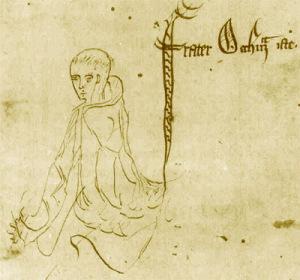Quantum mechanics shows deep connections based on empirical evidence.This is Einstein’s famous “spooky action at a distance.”Particles that split apart from one another seem to be in communication as they track on trajectories away from one another at incredible speeds.It’s almost as if there’s will involved.Maybe there is.If intention is part of the natural world, we’re in trouble.Well, at least stark materialism is.You can’t measure will.We all know what it is because we feel it.Try to define it.Isn’t will a matter of what you want?What could a particle possibly want?If it’s small it can’t hurt us, right?But once it crosses a certain level, it no longer works.Science trembles at quantum mechanics being applied at the non-microscopic level.

Ironically science is wedded to an idea proposed by a medieval cleric.Early scientists were often clergy—an association most scientists would prefer to forget these days.William of Ockham (fourteenth century) proposed an idea that became the surefooted stance of science in its toddler phase.Simply reduced it goes like this: the single natural explanation, without relying on outside forces, is probably the best.It’s known as Ockham’s Razor (aka Occam’s Razor). Yet Ockham was a Franciscan Friar, a cleric.His thinking and reasoning were necessarily informed by ecclesiastical thought.Or, not to put too fine a point on it, theology.His razor avoided entanglements.Ironically, science refers to this quantum connection as entanglement.
Humans, it seems, have a tendency toward contrariness.We’re oppositional.When we’re told that quantum mechanics applies only to the very small, we wonder if maybe the same principles don’t work “up here” at our scale.It’s hard to conceive that even our scale is simply a matter of perspective.Since we’re uncomfortable with the idea we suggest that only our species is conscious.That way we can keep the will out of animals as well as subatomic particles, let alone larger scale entities such as planets, galaxies, and universes.Maybe entanglement suggests Ockham’s Razor is dull.Before getting out the philosophical strop, perhaps we should ask if the simplest explanation is really the best after all.Maybe the best answer is far more complex than we’d like to admit.I love science.I still, when I have time, read science books written for the laity.It’s just that science, like religion, is part of a larger picture.As much as we fear entanglement, it is an empirically observed part of life in our universe.
